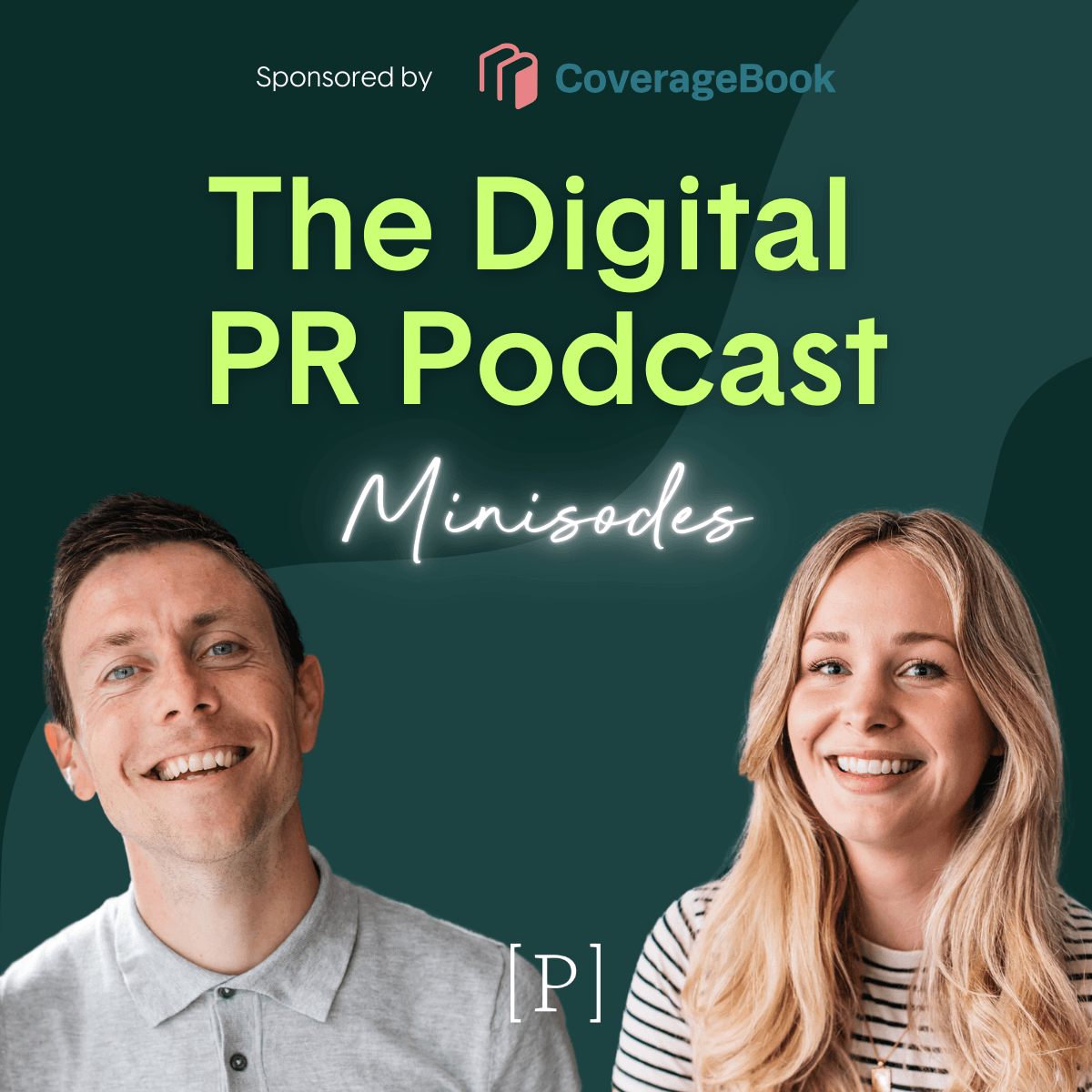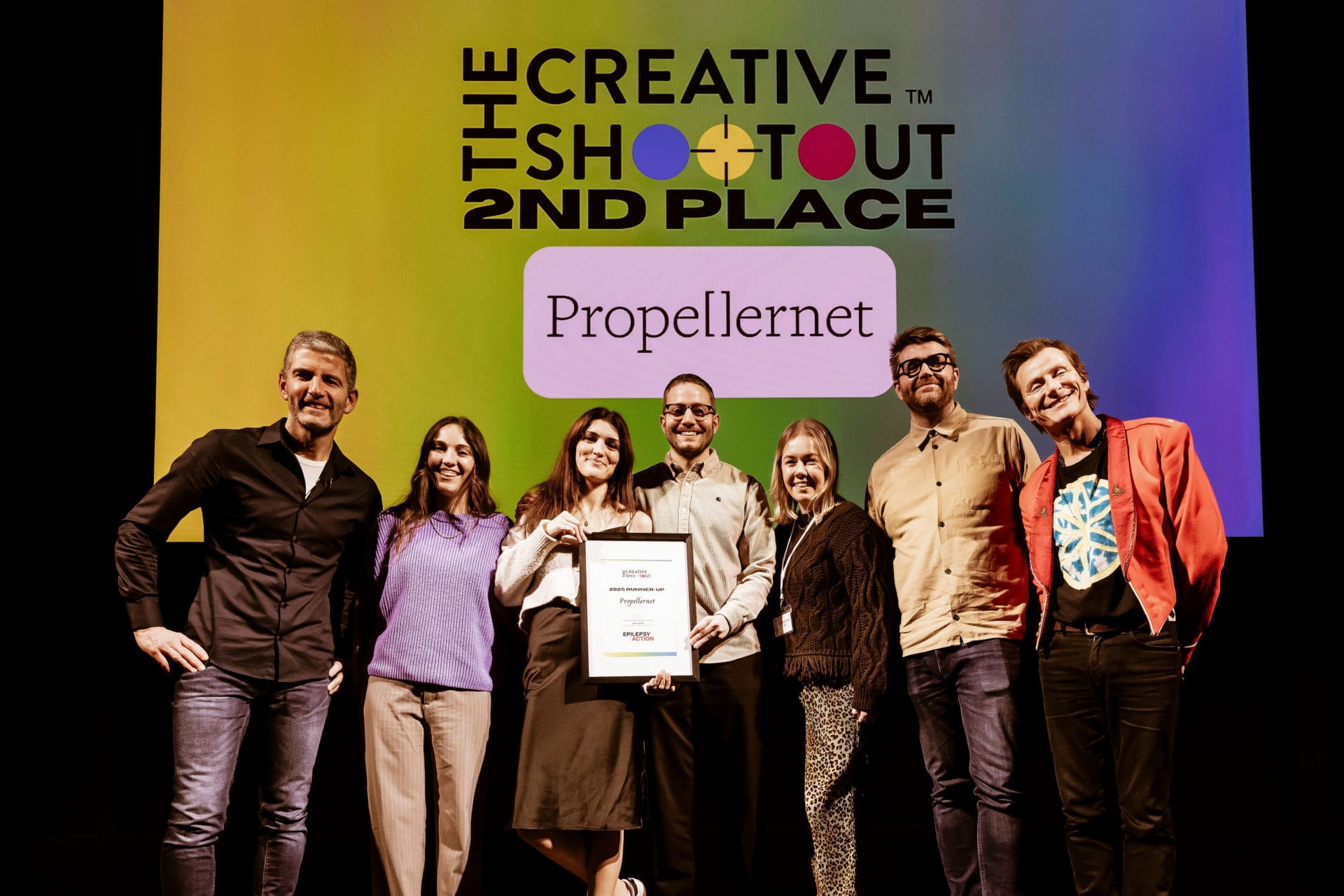
In this mini episode of the Digital PR Podcast, Lou chatted to Abi, our Digital PR Director at Propellernet. Abi shared her journey in digital PR, which began nearly seven years ago as an intern at a digital marketing agency. We discussed her evolving relationship with Twitter (or X, as it’s currently known) and how it has impacted her career and the industry as a whole.
Abi highlighted the positive aspects of Twitter, particularly its role in networking and community building among digital PR professionals. She emphasised how the platform has allowed her to connect with industry peers and even secure job opportunities. However, we also touched on the darker side of Twitter, including the potential for negative interactions and the pressure to share work publicly, which can lead to unwarranted critique. We explored the balance between sharing successes and protecting one’s work from competitive scrutiny, as well as the recent trend of toxicity within the digital PR community on the platform. Abi offered valuable insights for newcomers to X, encouraging them to engage with the community while also setting boundaries to protect their mental health. As we wrapped up, we briefly discussed the emergence of Threads as a potential competitor, though Abi noted that its current lack of features limits its utility for digital PR professionals.
Have a listen or read the full AI transcript below.
Louise Parker:
Hi, it’s Louise here from the Digital PR Podcast. We have something new for you this season, not just a new season of podcast episodes, but mini episodes as well. The guests are all from our very own Digital PR team at Propellernet. And we’re just going to have quick little chats about the topics that are interesting us at the moment. Hope you enjoy. Hi, Abby. Welcome to our little minisode. Would you mind giving the listeners a little overview of who you are and your career so far in digital PR?
Abi Bennetts:
Yeah, sure. Thank you so much for having me. Very excited to be here on the pod. So yes, I’m Digital PR Director at Propellernet. I’ve been working in digital PR for around, I think it’s coming up to five years now, which is crazy. A very long time. and kind of worked in agencies my whole career to date. So I started out as a digital marketing intern at a digital PR agency called Aira, which was close to where I lived at the time. And then by pure luck, they had a digital PR sort of area of the business and said, you know, maybe you’d like to try your hand at this thing called digital PR and SEO, of which I knew nothing about at the time. I ended up loving it and have sort of been building my career in it ever since. So yeah, all a bit of good luck really, but loving it still five years on. So that’s good, I think.
Louise Parker:
And you have the pleasure of working with me and Steve at Propellernet now.
Abi Bennetts:
Exactly, exactly. So in a great place with it.
Louise Parker:
So you’re here to talk about Twitter or X or whatever it is called at time of recording and how digital PRs can interact with it and use it for good. How would you describe your relationship with the platform?
Abi Bennetts:
I would say it’s been a journey. journey, for sure. I think when I first started out in digital PR, and I don’t know whether the sort of industry’s relationship with how they use Twitter, X, whatever it’s called, has changed as well, but it feels like certainly when I first started out as an intern, people were using it a lot more, it felt like there was perhaps more interaction across like different people in the industry. And I don’t know whether that’s because of COVID, where we obviously spent so much time online and so little time in person that people just feel a little bit burnt out by it now. But I think my own relationship was with it that I would spend a lot and a lot of time on the platform, getting to know lots of people in the industry, which was amazing. It really gave me amazing opportunities, whether that’s speaking opportunities, it obviously landed me my job for propellant, which is amazing. And I might not have got to this place without it. But at the same time, there definitely got to a point around the point in sort of COVID where I felt like I was using it so much. And it was kind of contributing to that feeling of not being able to switch off from work. I think as you were spending all day online at work, we weren’t allowed to leave our houses during COVID. And then in the evenings I’d be scrolling Twitter and sort of seeing these discussions and sometimes toxic discussions and debates and stuff on the app. And it just felt really quite hard to like get some space from the industry, I suppose. So I did feel like I took a few months where I just wasn’t really that active with it at all. And then yeah, built it back up over the last few months. Yeah, definitely a journey.
Louise Parker:
Yeah, we’ll definitely touch on the more negative aspects of Twitter or things to look out for when you’re using it. But to start off as a positive, now you’re kind of in a, your journey’s done and you’re in a good place with Twitter. What are you finding the best uses of it at the moment as a digital PR, so for work?
Abi Bennetts:
So I definitely think the networking within the industry and the sort of community of digital PRs and SEOs online on Twitter is just amazing and like I’m not sure it exists within many other industries in the way that it does for ours and it’s so lovely because it does mean that lots and lots of people within the industry have been able to make really good friends and really good connections which obviously opens up a lot of opportunities. As I said, I obviously got the job with Propellernet because I’d made a connection with you online on Twitter and then had seen that you were hiring through Twitter and a similar sort of thing happened with my job in the agency before Propellernet. So I think being able to build those connections when you can’t necessarily be going to loads of events where other people are going to be attending is just an amazing way to create opportunities for yourself within the industry. I think it’s also using it for your personal brand has been really like useful for me as well and again has probably opened up some opportunities for me. So being able to like establish myself as a digital PR within the industry and sort of share any thoughts I have on the industry or things that I’m doing I found to be really useful and particularly in our industry probably more useful than LinkedIn as well. So yeah I’d say definitely the whole networking like personal brand building has been quite good for me.
Louise Parker:
It’s interesting that you say you think it’s better than LinkedIn. Do you think that’s like an age thing or an industry thing or just LinkedIn’s a bit
Abi Bennetts:
Weird. I think LinkedIn’s definitely a bit weird yeah and maybe because the age thing might play into it and I think like the audience who sort of hang out on Twitter are generally more within our industry like I feel like a lot of our clients are on Twitter. I’ve connected with a lot of clients who weren’t clients at the time who later become clients that’s sort of quite nice to be connecting with them. Whereas I feel like LinkedIn’s a bit more sort of corporate thought leadership and it does obviously have that rep now of being quite inauthentic shall we say.
Louise Parker:
Yeah you need to like all the posts have to weave like a really intricate story and it does feel a bit contrived sometimes whereas Twitter feels a bit more ad hoc and you can just be a bit casual with it which suits people a little bit better.
Abi Bennetts:
Definitely. Yeah. And it’s a bit more fun. Like I feel like you can get your own personality across a lot easier on Twitter. There’s been lots of digital PR like meme accounts and lots of people doing their own silly memes and jokes and stuff, which I think is quite fun to engage with, but also put out there as an individual to help build that like personality within the industry. But I think it’s definitely, definitely more used for me anyway than LinkedIn for sure.
Louise Parker:
With Twitter, it’s obviously been known as the social media platform where journalists hang out. How have you found it useful being on Twitter as a digital PR in terms of gaining coverage, building up relationship with journalists? Do you think it’s useful or do you think actually, in reality, it hasn’t really added much to how much coverage you’ve got?
Abi Bennetts:
Yeah, it’s an interesting one. I think with like individual journalists, definitely, because I think if you, you know, following each other on Twitter, again, when you’re like sort of being quite authentic on the app, and you’re not always say posting about work, then it gives you an opportunity to sort of interact with that journalist on a more personal basis. And you can sort of use that as well in your outreach to be like, Oh, I saw on your Twitter that you were on holiday in Menorca. That looks lovely. So I think stuff like that comes in really useful, but then I suppose it is that whole thing of particularly now, felt it more than ever, where journalists don’t really seem to have as much time to sort of become besties with loads of PRs, which is sad. So it doesn’t feel like it’s essential in order to build good relationships with journalists, but it definitely provides sort of an in to be quite casual and more personable with them without texting them or sliding in the DMs on Instagram or something weird like that. So yeah, I definitely think it’s useful in that respect.
Louise Parker:
And in terms of the darker side of Twitter, there has been, like you said, a lot of talk, especially since COVID when people were a lot more kind of in social media because they didn’t have anything else to do. There’s been a lot of talk about how it can negatively affect your mental health, how it can promote kind of overworking, can just start to take over your life really. If you are using Twitter for a more work purpose, what are the kind of more negatives to it that you have seen?
Abi Bennetts:
So I think there’s like a whole thing around sharing our work online and I’ve definitely again probably had like a bit of a journey of thought with it over the five years that I’ve worked in the industry. Because in one respect I think sharing our work online is amazing, obviously like it can help to win new business like it acts as quite a nice outlet to share case studies with potential clients and people we might want to work with in the future. I think it’s also really useful to be sharing campaigns and stories and stuff like that within the industry so that we can inspire and sort of share our work with other people in the industry because it can feel really, I suppose like you’re in your own little world when you’re working in an agency and you don’t really know what other agencies are doing despite the fact that they’re doing literally the exact same thing as you like every single day. So I always think it’s really nice when you can log on to Twitter and see what people have been up to quite often that is where a lot of my story inspiration will come from because you sort of either see a format for like press office or you see someone touching upon a topic and that gets you thinking about like how you can use that for your clients. So there’s definitely positives to sharing it online but I think there’s also I suppose for me personally a wariness of sharing lots of campaigns on Twitter because firstly I do think it sort of opens up your work to critique which perhaps might not be warranted. There are some people on Twitter who, let’s say personalities, and they might just want to create controversy for the sake of controversy. I think there’s been a few examples recently where people have quite innocently shared pieces of work online to almost celebrate coverage or a story and then that’s kind of opened it up to people just being unkind, basically. And I don’t think that’s how the industry should be. We’re all doing the same job at the end of the day. We shouldn’t be creating an atmosphere or a community where people feel like they can’t celebrate their work. So I think there’s been a few instances of that where it’s like, I suppose it makes you wary to share what you’re working on in case people were to comment negatively on it. I think there’s also, with so many agencies being on Twitter, there’s opportunity for other agencies to then gain a competitive advantage because you’ve shared that campaign. So I know we’ve had our own personal example of this. When I worked at my previous agency and I’d shared something around an upcoming story that we were working on, Louise and the Propellernet team were also working on the same story. And then because she saw my tweet, she then went out with the story before me. which all is forgiven now but yeah clearly I’m still hanging on to that one but no but I think it definitely has made me think about what sorts of things I want to be sharing on there in terms of you don’t know who’s watching basically and how that could affect outcomes later down the line so yeah I think that’s one touch point of it. I think the whole industry, beef and drama in general, I think everyone’s grown a little bit tiresome of at times. Again, it’s kind of hard to say why, I don’t know whether you have any thoughts on why become a little bit more toxic over the last couple of years it feels like. I don’t know whether it’s where there is more competition or there are more people trying to become these personalities in the industry but it definitely feels like there’s been a few instances where there’s been this big blow up between random people in the industry for no real reason and that can feel quite toxic to be a part of sometimes.
Louise Parker:
Yeah I think it has got better in, let’s say, the last six months, but purely because people are like, it’s happened too much and I just can’t be bothered with this anymore. And so I think people just aren’t engaging or aren’t saying things that maybe they’re actually putting in DMs or whatever, or they’re just thinking, you know, I guess that’s better than nothing because you can’t say anything nice, don’t say anything at all or something like that. But it’s really hard because I feel like a lot of sometimes the beef and the drama could stem from someone giving an opinion on the fact that they actually, you know, they don’t think that methodology for that digital PR campaign that they’ve done is very good or that’s not very relevant for your client, which is an opinion. And that’s kind of like, you know, that is, you’re putting things out there. You can have a discussion about it. But then on the flip side, it’s like, what’s the point? As in, like, where are you taking this? And then, because you’re obviously going to offend someone, whether you think rightly, because no one likes their work to be necessarily critiqued. And then you have people on one side of the argument, you have people on the other, and it just starts to escalate. It’s really hard because I do think that, you know, there are plenty of things out in the marketing worlds that, you know, Adidas do or Nike do and, you know, I might not like it and I might talk about it but I think that is probably not going to get back to the person who’s made the Adidas advert. but because we’re a smaller industry and the real people behind it are posting it and all this kind of stuff, it’s far quicker and easier to get at that. I don’t know, it becomes a lot more personal and then I think a lot more dramatic. I personally don’t, I can’t remember the last time I’ve commented, not even negatively, but in a critical way on someone’s thing because I personally just don’t think it’s worth my time and I think it would upset someone and I don’t think I think it’s a big enough issue for me to comment on. There was a recent campaign, which I’m not even going to mention, that people were questioning why that type of brand has done it. They were questioning the topics around it, saying it was offensive and all that kind of stuff. And why add another voice to that? It made me think again about commenting on things like that.
Abi Bennetts:
Yeah, I think you’re totally right though and I think that, like you said, there’s nothing wrong with having an opinion and there’s nothing wrong with raising the sort of questions about, I don’t know, a certain campaign type or the relevance of a campaign to a client. if you feel like that is needed to better the industry or it might be something that could help someone’s work further down the line but I think there’s a way to do that and that way in my opinion would be to either directly message them or phrase it in a way that doesn’t just come across as a sort of diggy-outy comment where you know everyone’s gonna see it and I think it’s interesting that the last few little dramas that have happened in digital PR Twitter, it’s always the same names popping up and I would just be really interested to firstly see if it was those same people who would be piping up in person. because there are actually few events where we’re all in a room together. So I think I’d be interested to see how many of the digital PR personalities speak up as much in person as they do online and how many of them are sort of maybe just a little bit keyboard warrior-y. And I just think it’s interesting that it’s quite often the same people who are commenting on other people’s work, which I don’t think is necessarily always useful. Yeah, it’s a tough one, isn’t it?
Louise Parker:
I think, especially with Twitter as the way it is now, it’s full of a range of good things, bad things, things in between, which is just part and parcel with Twitter, it seems. There obviously is like a new platform that has recently emerged called Threads, which acts a lot like Twitter. Do you use it? Is it something that you think you might switch from Twitter to, or what are your general thoughts? Do you think it’s going to be a proper competitor to Twitter?
Abi Bennetts:
Yeah, I don’t know. It’s really hard to say. I have downloaded it. I haven’t used it. And I haven’t really looked at it since the sort of first two days of downloading it. And I don’t really know who has. Yeah. But I think there’s so many developments on Twitter slash X at the moment that God knows where that app and platform is going to end up in the next sort of two months. So I think if X or Twitter became a place where we no longer felt like we could sort of do our thing on that then maybe everyone would migrate over to threads as sort of an alternative because at the moment it is kind of just an identical Twitter. So yeah it’s hard to say in the future but at the moment I don’t know anyone who’s using it so I’m not sure it’s competing at the moment.
Louise Parker:
Yeah, someone in our team said the thing that’s like holding her back from using it in a more work capacity is because there’s no search function. So like if you want to kind of find a journey request or something like that, often on Twitter, you can look up journey request and then use certain keywords for your client. But that doesn’t exist currently on threads, I don’t believe. And so it’s really going to limit how you’d be able to use it with journalists and stuff like that. And at the moment, I’m not 100% convinced, but I might eat my words.
Abi Bennetts:
Yeah, we’ll have to see, won’t we? Any time we’ll tell, see what Elon Musk has got planned for the app over the coming months. It’s so volatile. I know, it’s crazy. I feel like, yeah, God knows what it’s going to be in the next year. I don’t really know.
Louise Parker:
And I guess finally, for people who, I hope people feel still interested in joining Twitter as a digital PR or using it, because yes, we did touch on some of the more negative aspects, but there are lots of positives to it and it can be used quite neutrally as well. If there were people who were looking to start using it, you know, what are your kind of tips? What are things that you think they should bear in mind in terms of what they’re posting or how they’re using the app, things like that?
Abi Bennetts:
Yeah, I would say, yeah, I would definitely encourage like any digital PR to use it. As I say, I think it’s pretty invaluable when it comes to networking in the industry, but it’s also a really, really great place for inspiration, even with non-work stuff. So even like, I think more and more, I’ve been following non-work stuff that interests me as well as having my digital PR people that I follow. because again even if you see like a meme on Twitter or a discussion like quite an organic discussion about something random that again can quite often spark an idea so I think having a little scroll through your Twitter is like a little place to bounce ideas from is quite nice. But yeah I’d say to follow people that you admire within the industry or sort of people who are leading agencies or who are quite active in the industry as they can quite often provide like lots of good advice perhaps around the role. They’re often sharing like lots of great work from the agencies that they’re working at which again is obviously like really nice for inspiration purposes. What I would probably say if I had my time again with it would be to just put some boundaries in place with it I suppose and just be more aware of if you’re on holiday maybe take a little twitter break maybe not just look at it for a week and see how that affects your ability to shut off from work. So I think Even if you’re not looking at emails or looking at slack, I think seeing people in the industry and talking about stuff within digital PR and SEO, I think that can feel quite, yeah, it’s going to sort of impede on your mental space around work when you’re supposed to be on holiday. And I think just generally as well, when it comes to shutting down from the end of the day, there is a lot of stuff around the news and just the general madness of the world on Twitter as well. So I think it’s quite easy to spend all your spare time just scrolling through because it can feel quite productive or it can feel like it’s going to help your role, but I think the more boundaries you have with it, the better.
Louise Parker:
And you’ve got to save time for all your scrolling on TikTok. Exactly. All your other apps on your phone. Exactly. Those are very, very good tips. And it’s nice to also remind people that, yeah, you don’t have to be tweeting out yourself. You can be using Twitter just as, you know, reading and getting to know the industry. Some really nice tips there. Lovely. Well, thank you, Abby, for joining our Minnesota and sharing your thoughts on Twitter. For everyone listening, thank you for tuning in and join us on Thursday for one of our main episodes.






